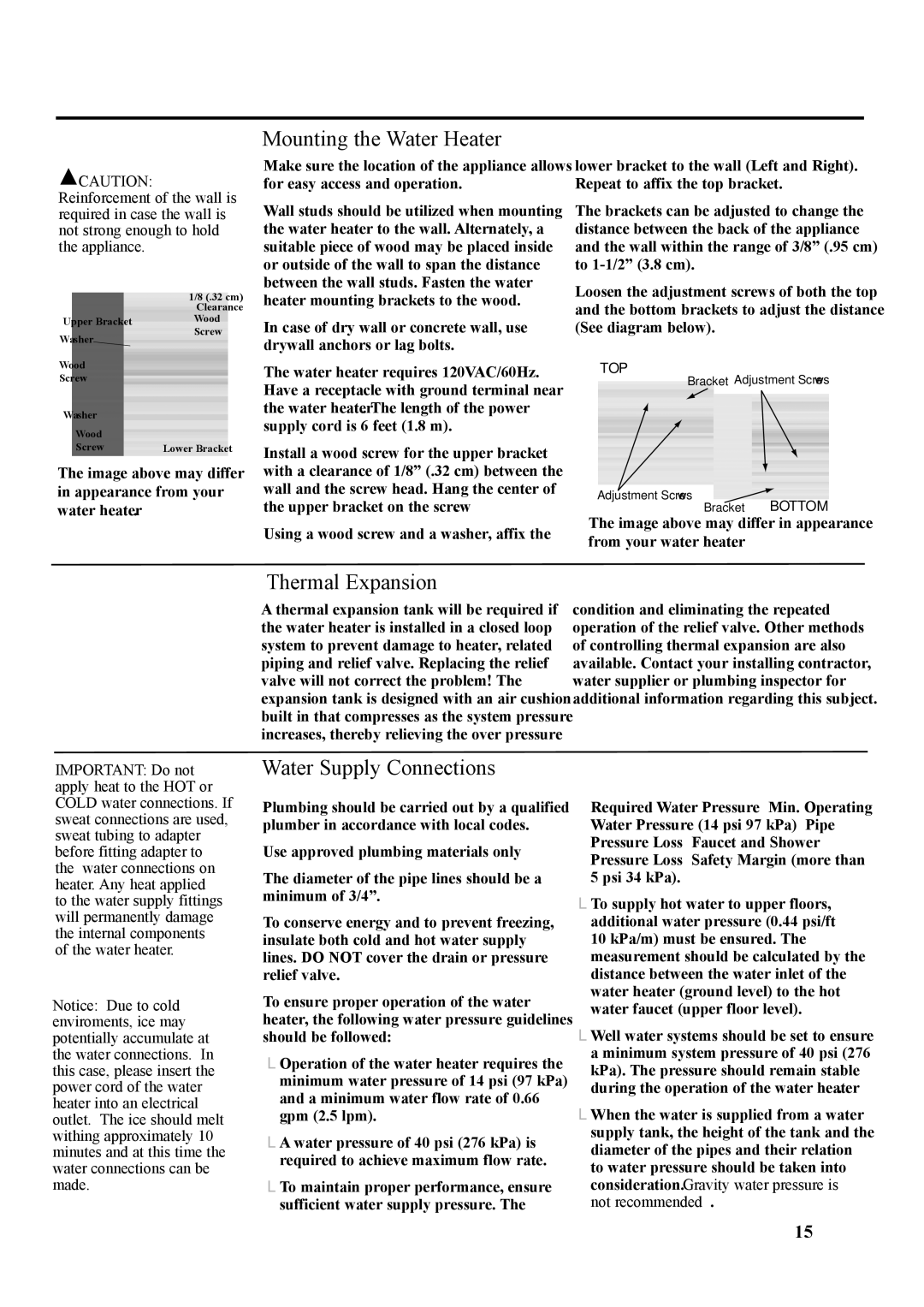
![]() CAUTION: Reinforcement of the wall is required in case the wall is not strong enough to hold the appliance.
CAUTION: Reinforcement of the wall is required in case the wall is not strong enough to hold the appliance.
|
| 1/8" ( .32 cm) |
|
| Clearance |
Upper Bracket | Wood | |
Washer |
| Screw |
Wood |
| |
Screw |
| |
Washer |
| |
Wood |
| |
Screw | Lower Bracket | |
The image above may differ in appearance from your water heater..
Mounting the Water Heater
Make sure the location of the appliance allows for easy access and operation..
Wall studs should be utilized when mounting the water heater to the wall.. Alternately, a suitable piece of wood may be placed inside or outside of the wall to span the distance between the wall studs.. Fasten the water heater mounting brackets to the wood..
In case of dry wall or concrete wall, use drywall anchors or lag bolts..
The water heater requires 120VAC/60Hz.. Have a receptacle with ground terminal near the water heater.. The length of the power supply cord is 6 feet (1..8 m)..
Install a wood screw for the upper bracket with a clearance of 1/8” (..32 cm) between the wall and the screw head.. Hang the center of the upper bracket on the screw..
Using a wood screw and a washer, affix the
lower bracket to the wall (Left and Right).. Repeat to affix the top bracket..
The brackets can be adjusted to change the distance between the back of the appliance and the wall within the range of 3/8” (..95 cm) to
Loosen the adjustment screws of both the top and the bottom brackets to adjust the distance (See diagram below)..
TOP
Bracket Adjustment Screws
Adjustment Screws![]() Bracket BOTTOM
Bracket BOTTOM
The image above may differ in appearance from your water heater..
Thermal Expansion
A thermal expansion tank will be required if the water heater is installed in a closed loop system to prevent damage to heater, related piping and relief valve.. Replacing the relief valve will not correct the problem! The expansion tank is designed with an air cushion built in that compresses as the system pressure increases, thereby relieving the over pressure
condition and eliminating the repeated operation of the relief valve.. Other methods of controlling thermal expansion are also available.. Contact your installing contractor, water supplier or plumbing inspector for additional information regarding this subject..
IMPORTANT: Do not apply heat to the HOT or COLD water connections. If sweat connections are used, sweat tubing to adapter before fitting adapter to the water connections on heater. Any heat applied to the water supply fittings will permanently damage the internal components of the water heater.
Notice: Due to cold enviroments, ice may potentially accumulate at the water connections. In this case, please insert the power cord of the water heater into an electrical outlet. The ice should melt withing approximately 10 minutes and at this time the water connections can be made.
Water Supply Connections
Plumbing should be carried out by a qualified plumber in accordance with local codes..
Use approved plumbing materials only..
The diameter of the pipe lines should be a minimum of 3/4”..
To conserve energy and to prevent freezing, insulate both cold and hot water supply lines.. DO NOT cover the drain or pressure relief valve..
To ensure proper operation of the water heater, the following water pressure guidelines should be followed:
●Operation of the water heater requires the minimum water pressure of 14 psi (97 kPa) and a minimum water flow rate of 0..66 gpm (2..5 lpm)..
●A water pressure of 40 psi (276 kPa) is required to achieve maximum flow rate..
●To maintain proper performance, ensure sufficient water supply pressure.. The
Required Water Pressure = Min.. Operating Water Pressure (14 psi [97 kPa]) + Pipe Pressure Loss + Faucet and Shower Pressure Loss + Safety Margin (more than 5 psi [34 kPa])..
●To supply hot water to upper floors, additional water pressure (0..44 psi/ft [10 kPa/m]) must be ensured.. The measurement should be calculated by the distance between the water inlet of the water heater (ground level) to the hot water faucet (upper floor level)..
●Well water systems should be set to ensure a minimum system pressure of 40 psi (276 kPa).. The pressure should remain stable during the operation of the water heater..
●When the water is supplied from a water supply tank, the height of the tank and the diameter of the pipes and their relation to water pressure should be taken into consideration.. Gravity water pressure is not recommended..
15
